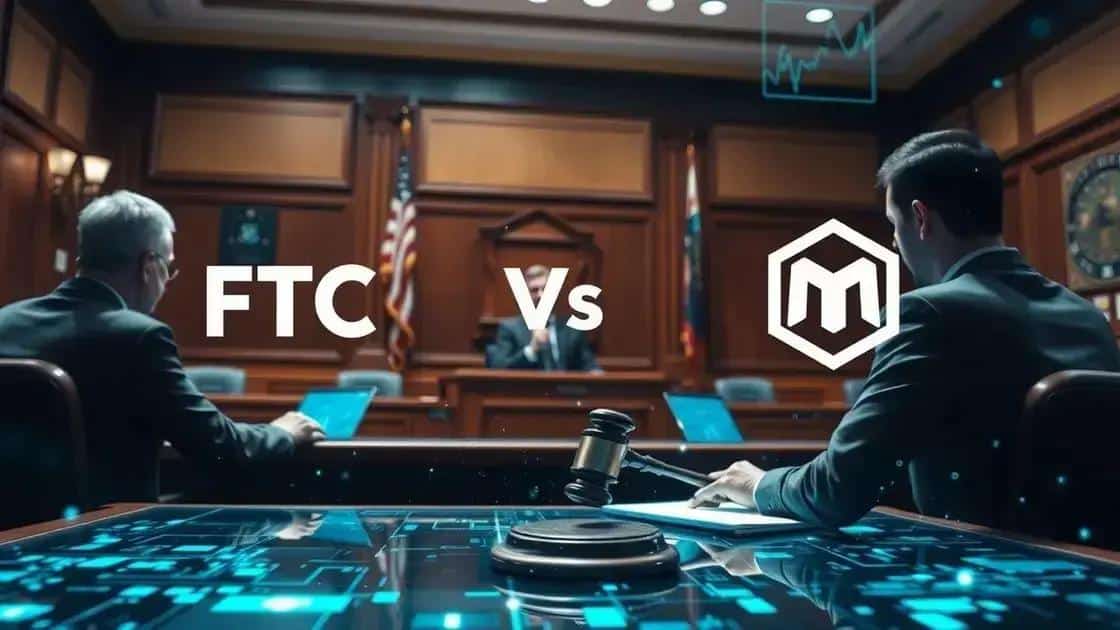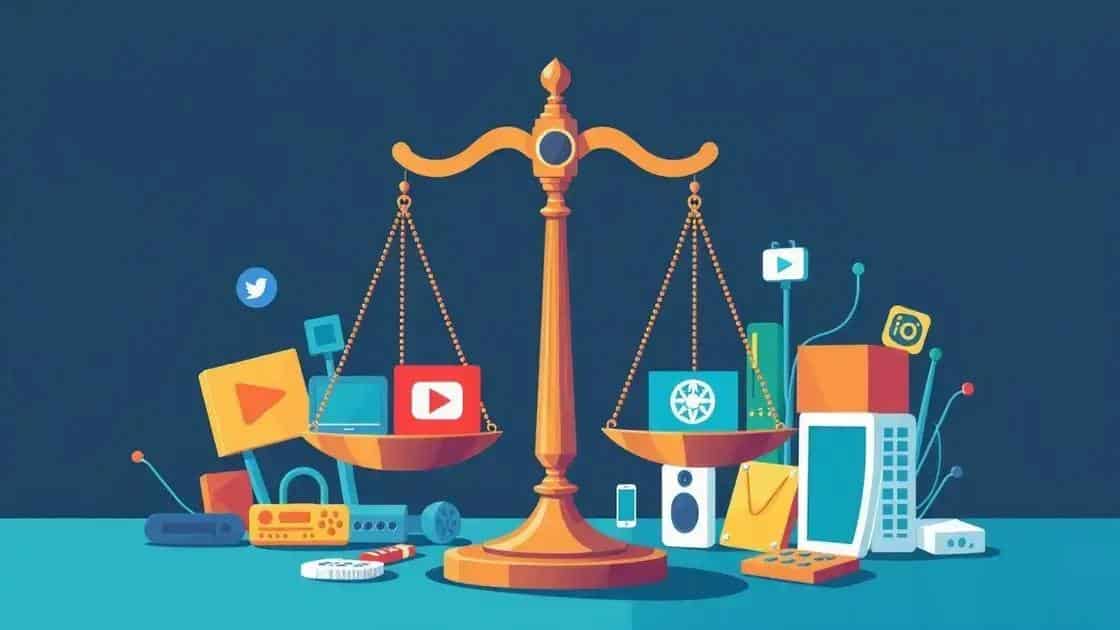FTC files antitrust case against Meta: What it means for you

Anúncios
The FTC files an antitrust case against Meta to challenge its market dominance, aiming to enhance competition and protect consumer rights through potential regulatory changes.
The FTC files antitrust case against Meta is a significant move that could reshape the tech landscape. Have you considered how this might affect your online experience?
Anúncios
Background of the FTC case against Meta
The FTC case against Meta marks a pivotal moment in technology regulation. Understanding the background helps us grasp the implications of this legal battle. The investigation centers on whether Meta is abusing its position in the market.
Key Events Leading to the Case
Several developments paved the way for the FTC’s actions. For instance, growing concerns about privacy and data management significantly influenced public sentiment. As Meta’s platforms expanded, so did scrutiny from regulators and consumers alike.
Impact of Previous Antitrust Cases
Previous cases set a precedent that the FTC is likely drawing upon. Notably, recent antitrust actions against other tech giants sparked heated discussions about industry practices.
Anúncios
- Concerns about monopolistic behavior
- Consumer protection issues
- Market competition and innovation
These elements illustrate a broader trend in the tech industry that the FTC is actively addressing. The case against Meta isn’t just about fines or penalties; it’s about how technology shapes our lives and interactions.
The FTC has indicated that it aims to promote competition and prevent monopolies from stifling innovation. The outcome of this case could set critical precedents for how tech companies are regulated.
Public Response and Reactions
The public reaction to the FTC’s actions has been mixed. Some view the case as a necessary step toward greater accountability, while others express concern about overreach. This debate highlights the delicate balance between regulation and innovation.
As the proceedings unfold, observers will be closely watching the implications for consumers, competitors, and the future landscape of digital media.
What antitrust means for the tech industry

Understanding what antitrust means for the tech industry is crucial for both consumers and companies. Antitrust laws are designed to promote fair competition and prevent monopolies, which can harm innovation and consumer choice.
The Basics of Antitrust Laws
Antitrust laws exist to maintain a healthy market. They prevent companies from engaging in unfair practices that could limit competition. These laws affect how tech companies operate and interact with one another.
Impact on Market Competition
When companies face antitrust actions, it can lead to significant changes in the industry landscape. For instance, smaller companies may gain a better chance to compete, leading to more options for consumers.
- Encourages innovation among competitors
- Protects consumer interests and choices
- Reduces prices and enhances quality of services
These impacts illustrate the importance of a competitive marketplace. It encourages companies to strive for better products and services.
In recent years, the rise of major tech companies has drawn the attention of regulators. As these companies grow, they can dominate the market. This dominance raises concerns among lawmakers and consumers alike.
The Role of Government Agencies
Government agencies play a key role in enforcing antitrust laws. They investigate companies suspected of unfair practices. If a company is found guilty, it can face substantial penalties, and changes to its business practices may be required.
Overall, the effects of antitrust measures can lead to a more vibrant tech industry. These rules help ensure that new and innovative ideas have a chance to succeed. As this area continues to evolve, both businesses and consumers must stay informed about how antitrust actions shape the market.
Potential impact on users and consumers
The potential impact of the FTC case on users and consumers is significant and multifaceted. As the case unfolds, it could change the ways platforms operate and how personal data is managed.
Improved User Privacy
With increased regulatory scrutiny, companies like Meta may be compelled to enhance their data protection practices. This could lead to better privacy measures, which are crucial in today’s digital landscape.
More Choices for Consumers
The case could also promote competition, allowing new players to enter the market. This increase in competition often results in more options for consumers.
- Access to innovative products and services
- Potentially lower prices due to increased competition
- Enhanced quality of user experience
When companies face strict regulations, they often need to prioritize customer satisfaction to stay relevant. As a result, users might benefit from improved services and features across platforms.
Awareness of Antitrust Issues
This legal battle will likely raise awareness of antitrust issues among users. As consumers become more informed, they may expect companies to uphold higher ethical standards and prioritize fair practices.
The effects of the FTC case could usher in a new era of accountability for tech giants. This might encourage users to support companies that demonstrate a commitment to fair competition and ethical behavior.
As the outcome of the case becomes clearer, users will closely watch how Meta adjusts its practices. Will they embrace transparency? How will they address user concerns? These questions will be vital for consumers as they navigate this evolving digital landscape.
What to watch for in the case’s outcome

As the FTC case against Meta progresses, there are several key factors to watch that could shape the future of the tech industry. Understanding these elements can help consumers and industry stakeholders stay informed.
Regulatory Changes
One important aspect is how the case may influence future regulations. If the FTC wins, it could set a precedent, leading to stricter rules for other tech companies. This change might promote a fairer marketplace.
Impact on Business Operations
It’s also crucial to see how Meta will adapt its business practices. Changes might include increased transparency and improved data privacy measures. The company may need to demonstrate a commitment to consumer rights.
- Enhanced user control over personal data
- Potential partnerships with regulators
- Improvements in service quality and security
These shifts can further influence how users perceive and interact with the platform.
User Reactions and Engagement
Another key aspect to monitor is user response. How will consumers react to these potential changes? Increased awareness about privacy and competition might lead users to demand better services. Understanding consumer sentiment can provide insights into the case’s broader impact.
As the outcome approaches, public sentiment could play a significant role in shaping Meta’s response. The company may need to adjust its strategies to align with user expectations.
Long-term Industry Implications
Finally, consider the broader implications for the tech industry. This case could drive innovation as companies rethink their practices in light of regulatory pressure. It might also lead to increased investment in privacy and security technologies.
The outcome of the FTC case against Meta is likely to reverberate throughout the tech world, encouraging developments aimed at putting consumers first.
FAQ – Frequently Asked Questions about the FTC Case Against Meta
What is the FTC case against Meta about?
The FTC case against Meta focuses on allegations of antitrust violations, examining whether the company has abused its market dominance.
How could this case impact my privacy as a user?
The case may lead to improved data protection practices from Meta, ensuring better privacy controls for users.
What should I expect regarding competition in the tech industry?
If the FTC wins, we could see increased competition, leading to more options for consumers and potentially lower prices.
What changes might Meta implement if they lose the case?
Meta may have to adapt its business practices, enhancing transparency and accountability to comply with regulatory requirements.






